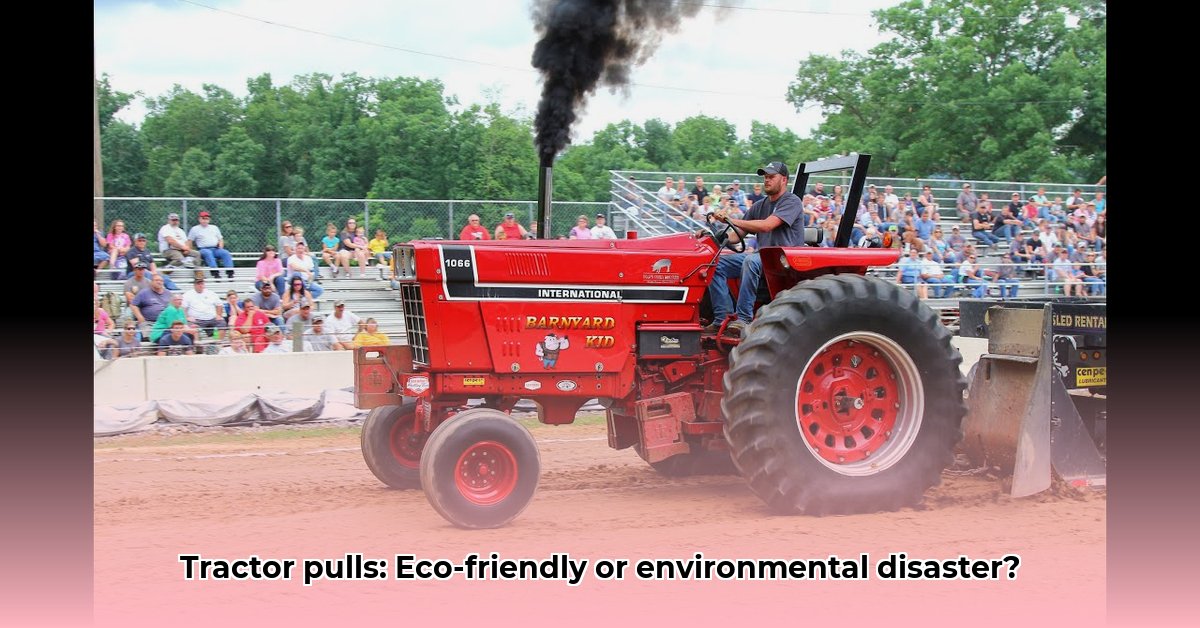
The Thrill of the Pull: A Contested Tradition
Farm tractor pulls are exhilarating displays of power and precision, captivating audiences with their spectacle of modified tractors competing in tests of strength. However, the roaring engines and churning wheels raise a critical question: What is the environmental cost of this popular pastime, and how can we reconcile the excitement of the event with the urgent need for sustainable agriculture? This article analyzes the environmental footprint of tractor pulls, examining fuel consumption, emissions, land use impacts, and proposes actionable steps toward a greener future for this beloved tradition.
Fuel Consumption: A Significant Carbon Footprint
The tractors used in competitive pulls are heavily modified for maximum power output, often featuring oversized engines and performance enhancements. This results in significantly higher fuel consumption compared to standard agricultural machinery. While precise figures are lacking, some experts estimate that a single event could consume enough fuel to power a small farm for several weeks. This considerable fuel use translates directly into a substantial carbon footprint contributing to greenhouse gas emissions and climate change. Isn't it ironic that an event celebrating agricultural machinery contributes so heavily to environmental problems detrimental to agriculture itself?
Emissions: Beyond the Exhaust Fumes
The high fuel consumption directly impacts air quality. Modified tractor engines release not only carbon dioxide (CO2), a primary greenhouse gas, but also particulate matter (PM) and other harmful pollutants. These emissions can have significant negative consequences for human health, affecting both spectators and nearby communities. The release of pollutants raises serious questions about the public health implications of these events, especially for the long-term well-being of surrounding populations. How can we balance the short-term thrill of a tractor pull with the potential for long-term health consequences?
Land Use and Soil Compaction: A Hidden Impact
Tractor pulls demand considerable land area for the competition itself. The repeated passage of heavily modified, high-weight tractors across the pulling track leads to soil compaction. This compaction significantly reduces the soil's ability to retain water and support plant life, impacting long-term agricultural productivity in the area. The environmental implications extend beyond the immediate event, potentially harming the very agricultural landscape that this event is meant to celebrate. What are the long-term effects on soil health and agricultural sustainability of compaction from repeated tractor pulls?
Towards Sustainable Tractor Pulls: Actionable Solutions
The environmental challenges posed by tractor pulls are not insurmountable. By adopting a multi-pronged approach, we can significantly reduce their impact. This requires a collective effort from event organizers, competitors, sponsors, and governing bodies.
Transition to Alternative Fuels: Replacing fossil fuels with cleaner alternatives such as biofuels (e.g., biodiesel, bioethanol) or hydrogen is crucial. This transition requires significant investment in research and development, but would dramatically reduce greenhouse gas emissions.
Engine Optimization and Efficiency Upgrades: Technological advancements in engine design and efficiency can significantly reduce fuel consumption without sacrificing power. Optimizing engine performance through targeted design improvements and better fuel management systems could dramatically reduce fuel consumption.
Carbon Offsetting Initiatives: While transitioning to cleaner alternatives, carbon offsetting programs can help neutralize some of the unavoidable emissions. Investing in reforestation or other carbon sequestration projects helps mitigate the environmental impact of the event.
Sustainable Land Management Practices: Implementing soil aeration and other restorative techniques after the event can mitigate soil compaction, preserving agricultural land use and long-term productivity. Post-event soil rehabilitation practices, such as aeration, minimize the negative consequences of soil compaction.
Collaboration for a Greener Future
Dr. Emily Carter, Professor of Environmental Engineering at the University of California, Berkeley, emphasizes the importance of collaboration: "Addressing the environmental impact of tractor pulls demands a multifaceted approach. Open dialogue between event organizers, participants, researchers, and policymakers is essential to developing and implementing effective solutions." This collaborative effort should focus on research, technological innovation, and responsible land management.
Key Takeaways:
- Tractor pulls contribute significantly to environmental concerns, including greenhouse gas emissions, air pollution, and soil compaction.
- Solutions involve transitioning to alternative fuels, optimizing engine efficiency, implementing robust carbon offsetting programs, and promoting sustainable land management practices.
- A collaborative effort involving all stakeholders—competitors, organizers, sponsors, researchers, and government agencies—is crucial for creating lasting change.
The future of tractor pulls rests on a commitment to environmental stewardship. By embracing innovation and collaboration, we can ensure that this exciting tradition continues while minimizing its negative impact, safeguarding both the environment and the future of the sport.